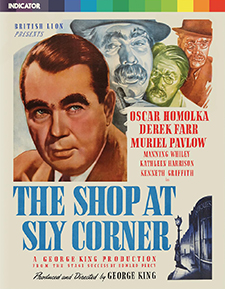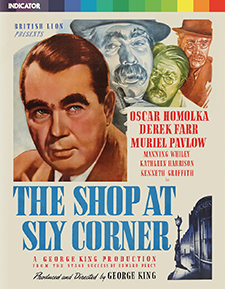Shop at Sly Corner, The (Blu-ray Review)

Director
George KingRelease Date(s)
1947 (June 18, 2024)Studio(s)
Pennant Productions/British Lion Films (Indicator/Powerhouse Films)- Film/Program Grade: B-
- Video Grade: A-
- Audio Grade: A
- Extras Grade: A-
Review
The Shop at Sly Corner (1947), meaninglessly retitled Code of Scotland Yard for its initial U.S. release, is a disappointing British crime drama, based on a popular, same-named play by Conservative MP Edward Percy. The film has fine production values and several decent performances but the story is sentimental and obvious, bordering on cruel and sadistic, and very predictable and obvious in other ways. It’s rather like a gussied-up version of the type of ‘30s and early ‘40s B-pictures that starred Boris Karloff as a sympathetic, grandfatherly criminal or rogue scientist. Unsurprisingly, Karloff himself starred in a short-lived Broadway run of the play in 1949.
In the film version, Oskar Homolka stars as wealthy French (but Viennese-accented) antiques dealer Descius Heiss, a walrus-mustachioed widower forever doting over his violin virtuoso daughter, Margaret (Muriel Pavlow). Though he seems plenty comfortable thanks to his prosperous shop, he does sideline work as a fence with longtime criminal partner Corder Morris (Manning Whiley). Getting old and weary, and with Margaret on the cusp of stardom as a soloist, Heiss, secretly an escapee of Devil’s Island (!) with the scars to prove it, tells Corder he plans to quit the fencing game. Unfortunately, Heiss’s slimy shop assistant, Archie Fellows (Kenneth Griffith), overhears all and begins blackmailing his boss, over many months soaking him for nearly everything he’s got. Heiss offers a huge settlement conditional on Archie moving to Canada, but the leech Archie is insatiable, demanding a partnership in the shop and Margaret’s hand in marriage, even though she’s already engaged to Robert Graham (Derek Farr).
Though handsomely produced with inky black-and-white cinematography by Hone Glendinning, it’s one of those screenplays where a fundamentally decent man and devoted father is put through the ringer. (Spoilers) After suffering the lash and worse on Devil’s Island, he builds a new life in England, his sideline as a fence by all appearances superfluous given the antique shop’s prosperity. Archie is an obvious jerk from the get-go: in an early scene he tries to rip-off a desperate granny (Katie Johnson from The Ladykillers) hoping to sell her music box; Heiss intercedes on her behalf but, inexplicably, doesn’t fire Archie for his dishonesty (and probable attempted theft). Archie’s blackmailing knows no bounds; he’s a total slimeball and when he crosses the line, demanding Margaret’s hand and the antiques shop besides, Heiss has had enough and strangles him. No doubt British audiences in 1947 wildly cheered when Heiss finally killed this weasily Welshman, and even Margaret’s beau, Robert, later admits he gladly would have killed him, too. Yet in these conservative times there was no way the British Board of Film Censors would have allowed Heiss to get away with it any more than Hollywood’s Production Code.
(More spoilers) In this regard, the script is incredibly obvious. An early scene has Robert returning to England from abroad, bringing back various exotica, including a South Seas native blowgun with a set of poison-tipped darts, still soaked with deadly poison. Beyond the glaring liability issues of selling deadly darts, the picture clumsily but relentlessly keeps referring to the poison darts (“I see you haven’t sold them yet!”) so frequently the viewer knows that, eventually, they’re going to be used.
In his more familiar later career, Oskar Homolka tended to overact, as if he was doing an exaggerated Oskar Homolka impersonation. His theatrical instincts are more in check here, still broad at times, almost cuddly, but credible. Once Scotland Yard steps in—their “Code” never entering the plot—Heiss deflects suspicion with his warm, friendly manner. Kenneth Griffith gets an “and introducing” credit, though had appeared in at least eight films prior to The Shop at Sly Corner; no doubt it gave him a career boost as he makes a particularly nasty villain.
Besides Katie Johnson, other familiar faces pop up, including Kathleen Harrison as a Cockney servant (of course), Irene Handl as an excitable witness, and Diana Dors in her screen debut, playing Archie’s materialistic girlfriend. Lying about her age, Dors was, incredibly, just 15 years old at the time. Like their screen characters, Muriel Pavlow and Derek Farr married shortly after filming, a bond that lasted until his death in 1986.
A 4K restoration, the Indicator/Powerhouse Films Region-Free Blu-ray release of The Shop at Sly Corner is another impressive 1.37:1 standard black-and-white release, with notably inky blacks and excellent contrast. The LPCM mono audio is supported by optional English subtitles.
Supplements consist of a new audio commentary track by film historian Josephine Botting and critic Phuong Le; Jonathan Rigby on Oscar Homolka; Muriel Pavlow in Conversation, a 2009 career overview interview with the actress that’s quite delightful and runs about 48 minutes. (Pavlow died in 2019 at 97; her co-star Kathleen Harrison lived to 103.) An image gallery rounds out the disc’s features.
For this review, we received a check disc only. The booklet packaged with the final release includes a booklet featuring a new essay by Steve Chibnall, archival interviews and articles, contemporary reviews, and film credits.
Not nearly as good as Powerhouse’s concurrent release of the far-superior Obsession, The Shop at Sly Corner isn’t terrible, but its interesting qualities are undermined by sloppy sentimentality, predictability, and major plot holes.
- Stuart Galbraith IV

